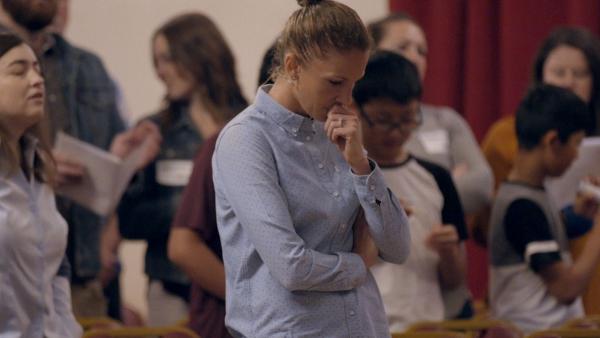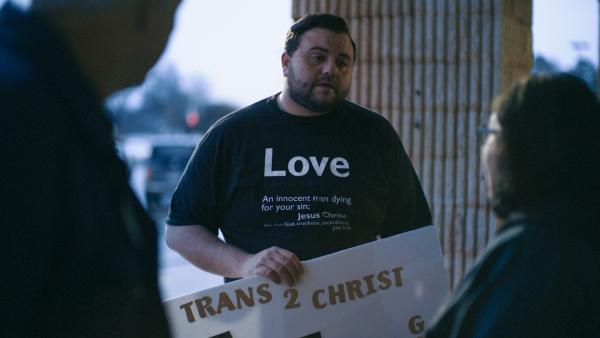![]() Exodus International probably needs no introduction for exvangelicals or members of the LGBT community. For the 37 years of its existence (1976-2013), it was the most vocal and visible part of the American Christian ex-gay movement, touting conversion therapy as a way out of the so-called sinful choice of the “gay lifestyle.”
Exodus International probably needs no introduction for exvangelicals or members of the LGBT community. For the 37 years of its existence (1976-2013), it was the most vocal and visible part of the American Christian ex-gay movement, touting conversion therapy as a way out of the so-called sinful choice of the “gay lifestyle.”
Pray Away, a documentary now on Netflix, puts some names and personal narratives onto the rise and fall of Exodus. Capably (if not innovatively) directed by Kristine Stolakis in her debut feature, we meet a co-founder, a VP, a chairman, a spokeswoman, and a youth speaker at their annual conferences.
The chairman, John Paulk, describes himself as the “most famous ex-gay in the world,” as he made the rounds of talk shows and news programs to share his testimony as an ex-gay happily married to an ex-lesbian. Most compelling is the story of Julie Rodgers, the youth speaker: after telling her fundamentalist mom she thought she was a lesbian, Rodgers spent the next nine years in reparative therapy, while being groomed for leadership on a national stage.

As you’ve probably guessed, all of these folks have since renounced their involvement in Exodus and now identify as gay. Paulk admits he was not only living a lie for the cameras, but was verbally lying in his denial of same-sex attraction. Rodgers addresses the self-loathing inherent to conversion therapy. The scars still visible from her repeated acts of self-injury offer the most affecting moment in what is generally a dispassionate documentary.
This tone plays well, permitting an analysis of the language and consequent behavior underpinning the ex-gay movement. Like any good fundamentalist effort, we get talk of “healing” and “overcoming” for those working the program. Same-sex attraction is equated with mental illness, attributed to dysfunctional parenting or childhood trauma, often in the form of repressed memories. Such teaching is mostly done by leaders and counselors with little or no psychological training, leaning on junk science from fringy, discredited practitioners for a semblance of credibility.
Homosexuality is minimized and demeaned by labeling it sin, calling it a lifestyle and a choice. To drum up support and outrage, not to mention donations from pew-sitters, it’s alleged without evidence that gayness is on a slippery slope to pedophilia and incest, that the “homosexual agenda” is an aggressive push for special rights and an “existential threat” to the traditional family.
We see all of this play out through abundant clips from TV programs, speaking engagements, individual and group therapy sessions, and Exodus’ annual conferences. Pray Away also follows Jeffrey McCall, a present-day ex-gay activist who claims a “trans to Christ” conversion. McCall’s organization, with its Orwellian name Freedom March, demonstrates that as long as religions hold to homophobic dogma, ex-gay narratives and some form of reparative therapy will persist. Exodus International may have gone the way of the passenger pigeon, but its practice and ideology live on.

McCall’s language exemplifies the “othering” of religion in general, juiced on steroids in groups like his. Those who disagree with him don’t merely have a different point of view, but are on the side of the Enemy, if not demonically possessed. Exodus International’s conduct was similar, if less dramatic: those who left their program were failures, dead to them, never spoken of again.
Pray Away optimistically shows that despite such linguistic othering, dialogue with those who think and act differently can change minds and behavior. One former Exodus leader even has the moral courage to speak of blood on his hands, due to the high suicide rates of youth forced into conversion therapy by their parents and churches.
It saddens me, however, to see that some of the ex-ex-gays profiled here still lean on Christianity for meaning in their lives. Evangelical or not, the general language of the Bible is of a core brokenness and worthlessness. The Trinity is Christianity’s Donald Trump, asserting “I alone can fix you.”
Even more problematic for LGBT Christians, homophobia is baked into the Bible. We’re not talking stray passages of Leviticus condemning tattoos or the eating of shellfish. From Genesis to the Pauline epistles, gayness is called out as a sin. To be Christian and gay demands a blinkered reading of the Bible and (let’s be frank) continued self-loathing. Staying on this path is evidence of a spiritual Stockholm Syndrome.
From this standpoint, Pray Away is like too many documentaries that grapple with the harm inflicted by American Christianity, whether in the arenas of LGBT rights, Israel/Palestine, or race. Lacking full intellectual honesty and vigor, they profess that homophobia, nationalism, and racism are bugs of aberrant belief, not features of religion itself.
I’m willing to bet there are ex-leaders from Exodus International who’ve renounced Christianity altogether. I wish Pray Away would’ve had the courage to speak at length with such individuals, rather than caving to the cultural pressure to leave religion and belief on a pedestal above scrutiny and interrogation.
(Image credit for star rating: Yasir72.multan CC BY-SA 3.0 )







